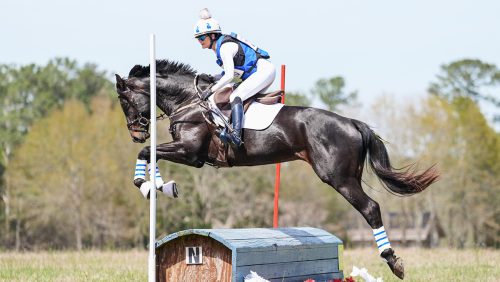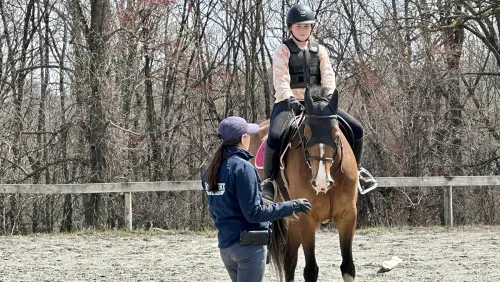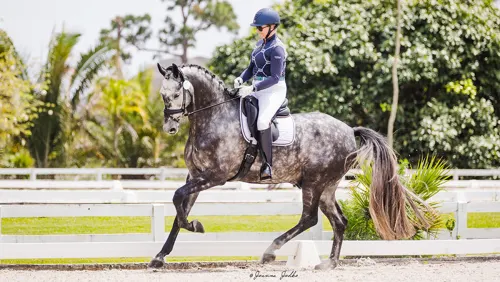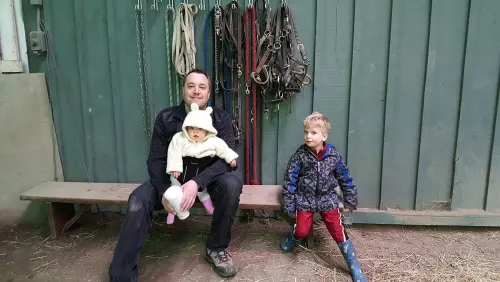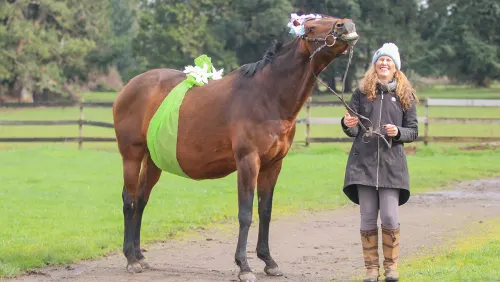Maybe you’ve just finished teaching your last week of summer camp. Or maybe your camps ended a few weeks ago. Regardless, there’s a good chance you’ve wondered at some point this summer “What was I thinking?” as you told a kid, for the 17th time, to put down the barn cat!
Last week, a camper’s mom was 25 minutes late for pickup. That meant you were stuck in the barn aisleway for those 25 minutes that you really didn’t have, making small talk with a 9-year-old while listing in your head all the things that needed done before lessons that afternoon.
“Oh, does camp end exactly at 1?” the mom asked, squinting at her watch.
Back in the barn, your teenage counselors swept the aisle, filled hay nets, and collected rogue crayons and windblown horse anatomy handouts.
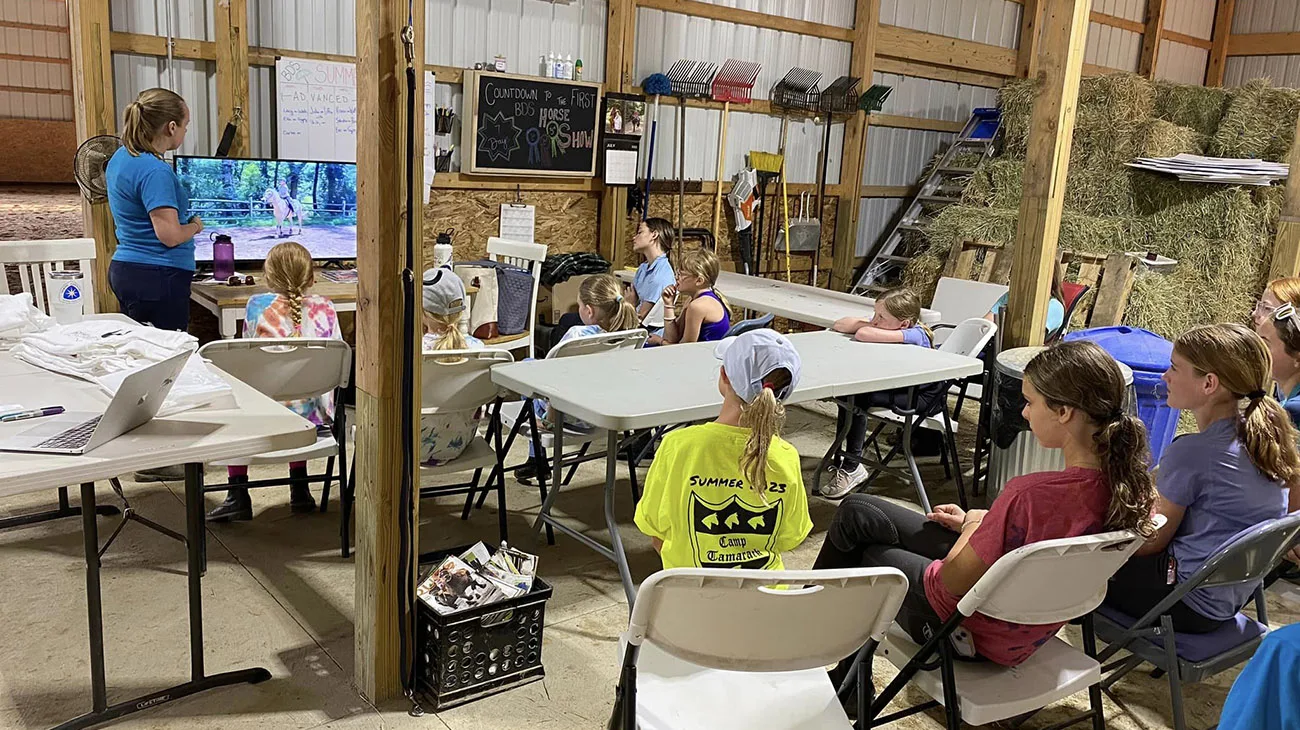
They also pause their chores to take so many selfies. And they’re doing something with Snapchat. You don’t understand how Snapchat even works, but they’re in hysterics about something, leaning against the stall doors, pitchforks in hand. Heaven help them if there’s any bullying towards the newest counselor, a quiet girl with big-rimmed glasses who stands nervously in front of Waffle’s stall whenever she’s not quite sure what she should do next.
In the wheelbarrow, you see more clean shavings mixed in with the manure than you’d like, but you take a deep breath. You grab a broom, remind them to shake out their pitchforks thoroughly, then crack a joke about this week’s most challenging camper. You know… that kid—the one who judo-kicked a Tonka truck across the lawn, and who head-butted the lounge TV with his helmeted head “just to see what would happen.”
Camps are exhausting.
Add to it that your toddler is working on a set of molars, waking up in tears a few times each night, sticking a chubby finger inside his mouth, saying, “Back there, momma. New teef. Owie.”
You’re worn out before you even begin.
Your horses are tired too.
They’re on night turnout now, enjoying cooler, bug-free air, but on camp days, their usually quiet barn is anything but. Somehow, even though your oldest camper is just 12 and maybe 90 pounds soaking wet, the group of them sounds like a herd of elephants as they run (“We don’t run in the barn! We don’t run in the barn!”) from one station to the next. Your horses wonder what happened to their morning naps. Moose gives you the side-eye and all 17-something hands of Justice tries to disappear in the back corner of his stall.
Every week, on day one, you go over safety. You have two rules. Rule #1: Do not run or yell in the barn. Rule #2: Don’t walk behind the horses.
You make a big fuss out of second one: “The front of the horse has eyeballs and ears and a nose and a mouth.” You cup your hands and put them on top of your head, wiggling them like little horse ears. The kids giggle.
ADVERTISEMENT
“The back of the horse has a tail. We don’t walk around the back of the horse!” The kids squeal, and you think that maybe this time they’ll get it. But at least a half-dozen times a day, you or a counselor snags a kid’s arm at the last minute before they walk right into one of your saintly equine’s rumps.
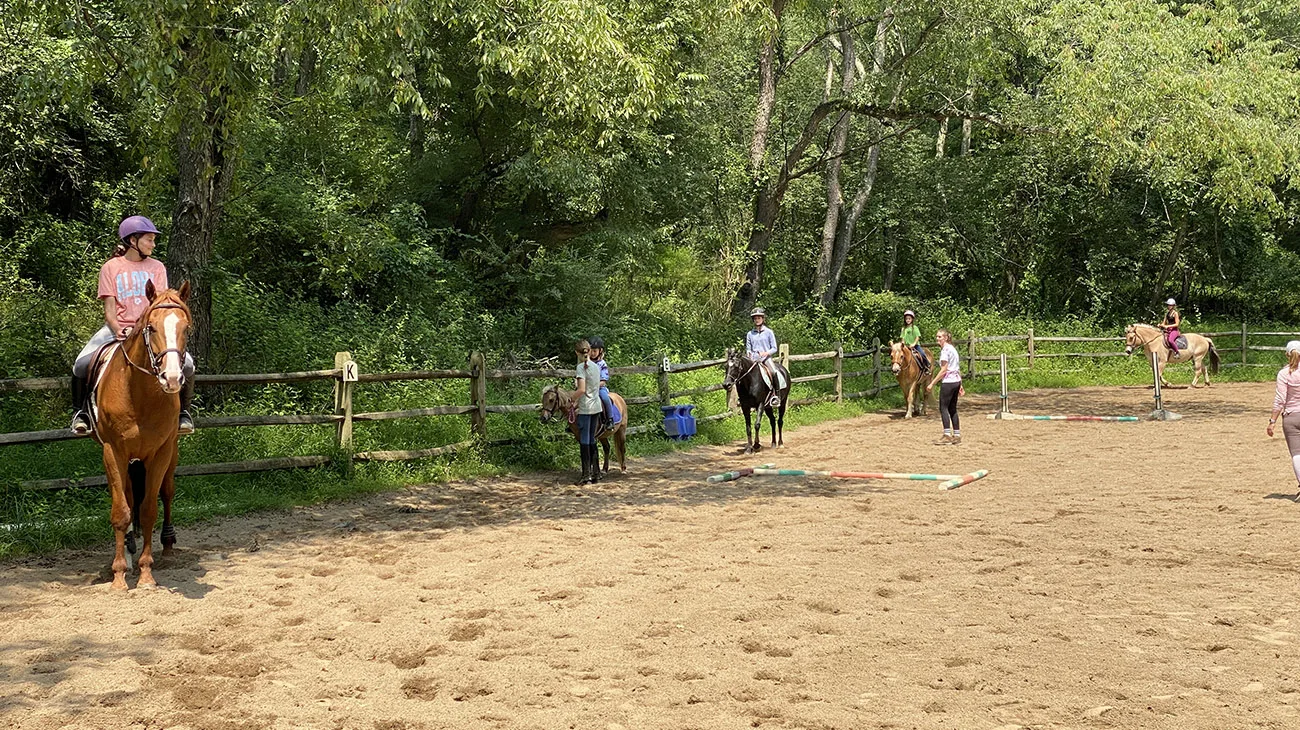
Riding is their favorite part, obviously. You’ve learned over the years that at your beginner camps, the kindest thing you can do for your horses is to clip reins on to their halters to keep a dozen sets of hands from pulling on bits. You’ve learned to hang hay bags at the end of the arena, so they can munch while groups rotate from one station to another. You’ve always felt that the horses are your colleagues, your partners, and their mental and physical health is a top priority, equal only in importance to the safety of your campers. Every night when the yard is quiet and you turn them out, you thank them for their patience. You know you owe them everything.
Every kid wants to ride first every day. This is impossible. Groups take turns riding first; there’s a carefully planned schedule. You show it to them. It’s stuck to the barn wall in half a dozen places. If you hear any of the following again, you think something inside you may crack:
“When does my group ride? Can we ride FIRST? We didn’t get to ride FIRST yet.”
“Can I ride Dakota? I didn’t get to ride Dakota yet?! I WANT TO RIDE DAKOTA.”
“Are we gonna run? Are we gonna jump? I already know how to ride. I trail rode on vacation last year. I can do it myself!”
A horse poops in the arena, and a kid looks at you, astounded.
“Is he allowed to poop there?” You laugh and walk to a pitchfork hanging on the wall, and your chunky Haflinger follows you, puppy-dog like.
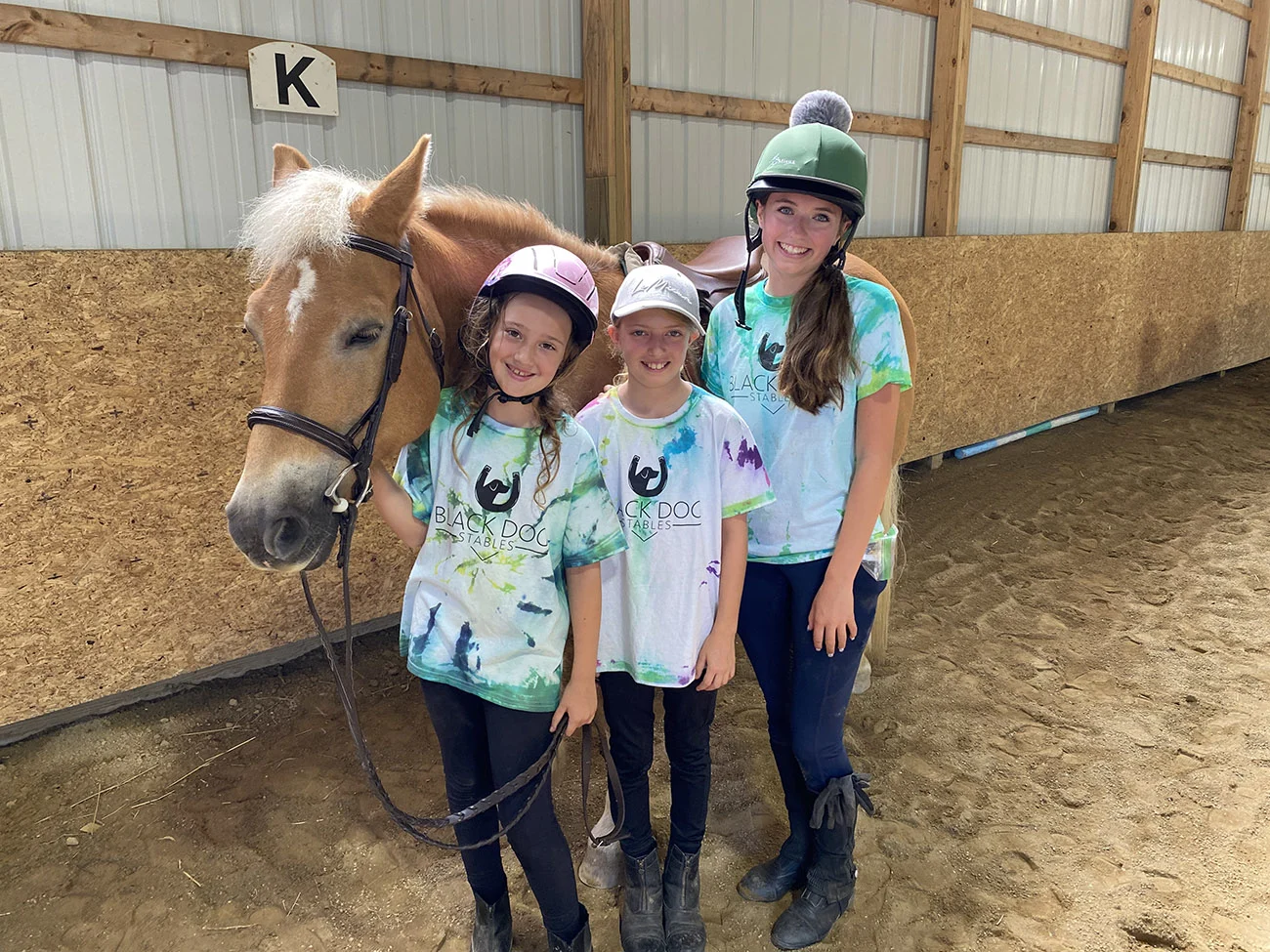
You laugh. You remember how new this all is for your campers. How excited they are. How many parents tell you this camp is the highlight of summer, and how their child looks forward to it all year long.
You print off one parent’s email and hang it on the board in the feed room for your counselors to see:
Our daughter had the best time at camp—we can’t thank you enough. I’m particularly grateful because we lost our beloved 16-year-old lab the week before camp— our daughter’s best friend—and the smile on her face in your photos was a far cry from the sad one we saw around the house this past week. The facility, you, and your counselors and family—it’s all amazing.
On the first day of Pony Camp a few weeks prior, a little boy, newly 4, sobbed into his mother’s thigh in the barn’s driveway, and his mom looked like she was trying not to burst into tears herself. You normally don’t let parents into the barn in the mornings, but you walked them both inside and let his mom help him decorate his folder with his name and a handful of horse stickers.
“It’s his first camp,” his mom said shakily. “He’s been so excited.”
You guessed she was questioning whether to leave him in a place she didn’t know, with people she’d never met. You told her he’d be OK. You knelt to his level and asked if he wanted to meet the horses. He sniffled but took your hand, and mom snuck out the barn door. She whispered that she’d wait in the car in case you needed her; you promised to call her if he didn’t settle soon.
ADVERTISEMENT
As you walked stall to stall, you thought of the 2-year-old little boy in your house up the gravel driveway, the one whose lower lip sometimes trembles in the morning when you tell him, “Mommy has to go to the barn.” The guilt can make you question everything.
It’s Penelope, the sassy mini in the last stall, who coaxes out the little boy’s first smile as she noses his arm, looking for treats. You text mom five minutes later to say he’s OK, that he’s stenciling his tote bag, and you send a photo of him hard at work. You send a few more photos throughout the day: one of her son riding Bear, holding the reins and grinning; another of him brushing Dakota in the crossties. He’s smiling. Mom tells you how worried she was. How she questioned sending him off so young.
The next morning, the little guy comes charging into the barn and grabs your leg in a hug. Mom follows with a little vase full of a few hand-cut flowers from her garden.
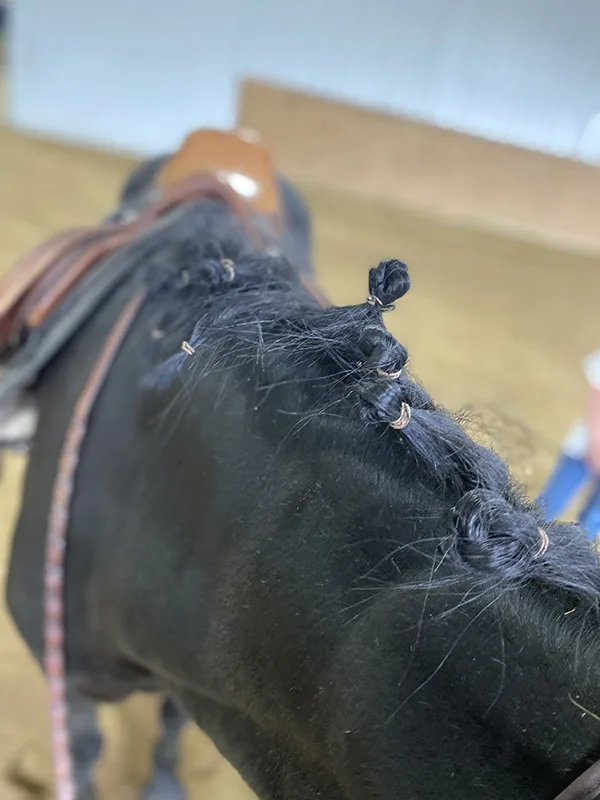
Summer camp is about horses, of course. But it’s about a lot more than horses, too.
It’s also about the time, during a particularly tough week, you take the group to the outdoor arena for a water balloon toss to burn some energy. While the campers are engaged in a water-balloon relay, you eyeball your teenage counselors and motion to the bucket of balloons. They sneakily grab a handful and toss them skyward, letting them rain down on the group of campers. Then it’s a coup—the campers charge the bucket, water balloons are flying, and everyone is in hysterics. A giggling camper charges you with a balloon, and you yell, “Make good choices!” as you juggle the latte your husband delivered mid-morning because your toddler was up again in the middle of the night.
It’s also about the little girl who on Monday, stands shaking at the mounting block, holding back tears and refusing to put a foot in the stirrup. It’s about how, by the end of the week, she’s walking and halting and steering through a little obstacle course on your steadiest pony.
It’s also about the text you get from one of your teens, asking for the number of that quiet counselor with the big-rimmed glasses so she can be invited to join the group for a trip to Starbucks and the local tack shop. “Thanks,” your counselor texts when you pass on the number. “We didn’t want her to be left out.”
It’s also about how your childhood best friend (you met at the barn, of course), now an award-winning equine photographer, drives almost two hours every week to photograph your campers. For years, she’s been one of your biggest cheerleaders, as you’ve been for her, and your heart is full when your busy worlds can collide.
It’s about walking to the barn with your toddler in the early evening. You want to see how the new OTTB is doing in his lesson, taught by your farm’s other instructor who has become one of your most cherished friends. You watch horse and rider warm up on the rail as your son digs in the sand with his plastic excavator. He rises and runs around in the tall grass by the field and your friend looks at him in the golden sunlight and says, “What a childhood he gets to have.”
You think about all the campers who say, “Wait, you get to live here? That’s so cool! You’re so lucky!”
You are lucky.
We are lucky.
It’s about that too.
Sarah K. Susa is the owner of Black Dog Stables just north of Pittsburgh, where she resides with her husband and young son. She has a B.A. in English and Creative Writing from Allegheny College and an M.Ed. from The University of Pennsylvania. She teaches high school English full-time, teaches riding lessons and facilitates educational programs at Black Dog Stables, and has no idea what you mean by the concept of free time.







